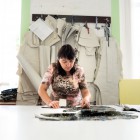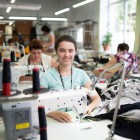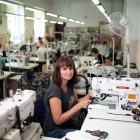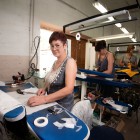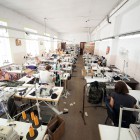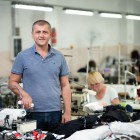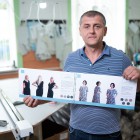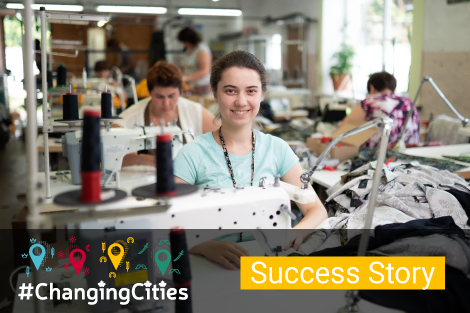 A textile social enterprise offering employment to women who find themselves in challenging life situations has been successfully operating in Poltava for six years now. In 2018, the Training and Production Centre Social Enterprise NGO received a grant from the SME Development Support Fund of the international technical assistance project: “Partnership for Local Economic Development and Democratic Governance” (PLEDDG). The project involved professional seamstress courses for women from socially vulnerable groups at the training and production centre, followed by product manufacturing for the Ukrainian market.
A textile social enterprise offering employment to women who find themselves in challenging life situations has been successfully operating in Poltava for six years now. In 2018, the Training and Production Centre Social Enterprise NGO received a grant from the SME Development Support Fund of the international technical assistance project: “Partnership for Local Economic Development and Democratic Governance” (PLEDDG). The project involved professional seamstress courses for women from socially vulnerable groups at the training and production centre, followed by product manufacturing for the Ukrainian market.
Employment of women who are former convicts, former drug addicts, or women living with HIV is highly problematic in Ukraine. There are no programs to support skills training and development, and entry/re-entry into the workforce for these groups of women. Social acceptance and integration are hindered, as the women are unable to make a living on their own. On top of not knowing how to monetize their skills, they fear judgment and/or rejection by potential employers. The Training and Production Centre Social Enterprise is helping women to not only find employment, but also to learn and to adapt or develop their qualifications.

“We are helping internally displaced people, former convicts, violence victims, former alcoholics and drug addicts. We mostly focus on women, due to the specifics of this segment of the population. They are most often referred to us through the
“Light of Hope” charity that co-founded the centre and facilitates the social adaptation of vulnerable groups. We have no restrictions when it comes to providing employment. A woman must be willing to work and have at least basic sewing skills. We teach them the rest in detail and help them with everything. We try to create the most comfortable conditions for our employees: there is no stigmatization or judgment here. Everybody is working on friendly terms exclusively,” says
Maryna Smirnova, director of the project titled “Development of Social Entrepreneurship in Poltava.”
The social enterprise currently employs 18 women, some of whom have been working there for close to five years. The principal partner and buyer of products is the French brand IKKS. Most of the training centre’s products are women’s blouses and dresses, and sometimes clothing for children and youth. The centre puts out 3,500 product units in an average month.

“I first came to the centre in the spring of 2019 after my release from prison. Of course, it is very hard to find a job in my situation. I had some sewing skills, which was my job in prison: I mostly made protective clothing and military uniforms. In other words, I worked with coarse materials. The training and production centre has a completely different specialization, so I had to learn to handle thin and gentle fabrics. At first, I had a hard time even holding these materials in my hands. I recall how sad I was at not being able to perform my job properly, and I was about to quit. Fortunately, they stopped me and asked me to stay. They let me have a few weeks off so I could get back to normal and calm down. I tried again afterwards, and things went much better. Even though I’ve been here for more than a year already, I am still learning to perfect my skills. I know that I can always approach the seamstresses and ask them for advice. They will guide me and help me out. This is very valuable. The team is simply great. I never felt out of place here,” says Claudia Korsia, an employee of the training and production centre.
As part of the project, a classroom for theoretical training of future seamstresses has been set up next to the centre and fitted out with additional equipment. This provided the material and technical resources for on-the-job training. The Training and Production Centre registered as a social enterprise in April 2019. It is operating as a vocational training centre for seamstresses and tailors. The first group of trainees enrolled in November 2019. After completing a 3-month course, 12 women were awarded qualification certificates, 8 of whom took up jobs at the centre.

“I learned about this training opportunity at the employment centre. I wanted to learn to sew just for myself a long time ago, so I simply went to give it a try. Centre employees with a pedagogical background provided instruction. Everything happened the way it does in colleges: we wrote test papers and passed exams. It was very interesting to learn the operation of sewing machines; all kinds of knots, buttons, overlocks, and the like. We practiced by making bed linen. On completion, I got a qualification certificate of a Class 2 seamstress. I stayed to work at the centre for a few weeks, and I remember that experience fondly. The team is very good. There is an atmosphere of mutual support. I still stay in touch with some of the women. I have chosen a different job. I am a social worker at the “Light of Hope” charity. Since this charity caters specifically to women from various socially vulnerable groups, now I can recommend they go to the Training and Production Centre, based on my own experience,” says Maryna Makarenko, participant at the Training and Production Centre.
In addition to the training component, the social enterprise has set up production of its own textile goods and is selling them on the Ukrainian market as a way to offer women more employment opportunities. The centre launched the “My Space” trademark and has been producing t-shirts, bed linen, and eco-bags under this brand since the fall of 2019.

“Currently we’re making customized adult and children’s bed linen and cotton t-shirts. In December 2019, we made 500 eco-bags brandishing various social slogans for a Poltava-based public transport company. As for t-shirts, we began making them with a purpose: to distribute them at various mass-attendance events, trainings, and interest group meetings. Of course, the selection of textile goods on the market is extremely broad now and it’s not easy to compete. However, buyers come to us not just for the high quality of our products, but also because they want to support the development of social enterprise. Our centre often hosts delegations from all over Ukraine. We give them tours and tell them about the specifics of our business, so when they need a product they always come to us,” says Maryna Smirnova.
The Training and Production Centre is growing dynamically and helping to solve problems of unemployment and low economic cap of vulnerable groups of women in Poltava. With the assistance of PLEDDG, this helps overcome social isolation and inequality of underprivileged members of the local community, prevents them from leaving the country, and creates proper working conditions for Ukrainians. Support of such initiatives promotes local private enterprise and directly contributes to economic development of the community. PLEDDG support in Poltava is aimed at the city’s overall growth: the Economic Growth Strategy to 2027 and the Program to Improve the Competitiveness of Small and Medium Businesses were previously developed for Poltava. Combined, all of these contribute to qualitative changes in the city and yield results. In 2019, Poltava was among the top-five most comfortable Ukrainian cities in a ranking published by “Focus” magazine.
 A textile social enterprise offering employment to women who find themselves in challenging life situations has been successfully operating in Poltava for six years now. In 2018, the Training and Production Centre Social Enterprise NGO received a grant from the SME Development Support Fund of the international technical assistance project: “Partnership for Local Economic Development and Democratic Governance” (PLEDDG). The project involved professional seamstress courses for women from socially vulnerable groups at the training and production centre, followed by product manufacturing for the Ukrainian market.
A textile social enterprise offering employment to women who find themselves in challenging life situations has been successfully operating in Poltava for six years now. In 2018, the Training and Production Centre Social Enterprise NGO received a grant from the SME Development Support Fund of the international technical assistance project: “Partnership for Local Economic Development and Democratic Governance” (PLEDDG). The project involved professional seamstress courses for women from socially vulnerable groups at the training and production centre, followed by product manufacturing for the Ukrainian market.





